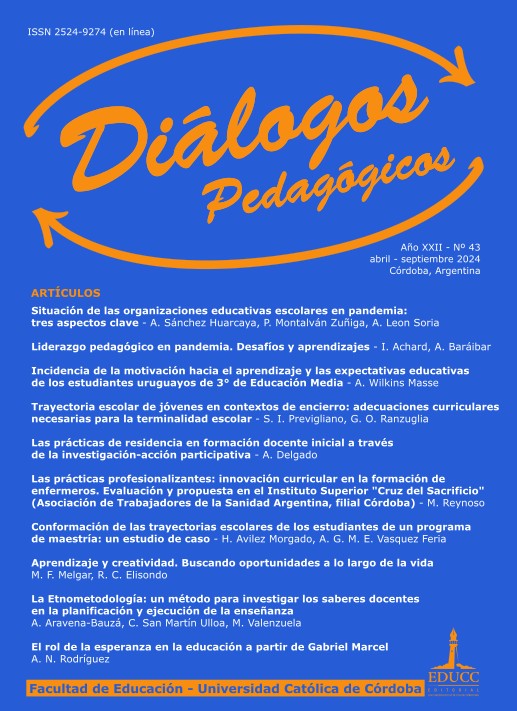School career of young people in contexts of confinement: curricular adjustments necessary for school completion
School career of young people in contexts of confinement: curricular adjustments necessary for school completion
DOI:
https://doi.org/10.22529/dp.2024.22(43)04Keywords:
School trajectory, scholarship, youth and adultsAbstract
This report refers to the theoretical review on the importance of constructing the curricular adjustments necessary to strengthen the school trajectories of young people in contexts of confinement. It focused on an educational center in the youth and adult modality that has particular characteristics. There is a need to develop school alternatives so that young people who remain out of school are included to complete their schooling. It is important to think about the need to look at the learning processes of young people who, although they have completed and certified their primary education, have not managed to develop basic literacy skills. This situation, which is present every day with more impact in all the educational institutions of the system, makes us reflect on how this modality should absorb this population and define a new instance of accreditation for these young people.Downloads
References
Argentina, Buenos Aires (2006, 14 de diciembre). Ley de Educación Nacional N.º 26206. https://www.argentina.gob.ar/sites/default/files/ley-de-educ-nac-58ac89392ea4c.pdf
Argentina, Córdoba (1991, 17 de diciembre). Ley Provincial de Educación N.º 8113. https://www.igualdadycalidadcba.gov.ar/SIPEC-CBA/publicaciones/legislacion/provincial/Ley%208113%20Provincial%20%20de%20Educacion.pdf
Bambozzi, E. (2005). Escritos Pedagógicos. Del Copista.
Conferencia Internacional de Educación de las Personas Adultas de Hamburgo y la Educación para Jóvenes y Adultos en América Latina (1997). Revista Latinoamericana de Estudios Educativos, XXVIII(2), 133-147. https://www.redalyc.org/articulo.oa?id=27028206
Kessler, G. (2004). Trayectorias escolares de jóvenes que cometieron delitos contra la propiedad con uso de violencia. Universidad de San Andrés.
Meirieu, P. (2007). Es responsabilidad del educador provocar el deseo de aprender. Cuadernos de pedagogía, 373, 43-47. https://uruguayeduca.anep.edu.uy/sites/default/files/2017-05/philippe%20meirieu.pdf
Noro, J. E. (2005). Pensar para educar. Filosofía y educación. Didascalia.
Organización de las Naciones Unidas para la Educación, la Ciencia y la Cultura [UNESCO]. (2022). El derecho a la educación. https://www.unesco.org/es/right-education/need-know
Scasso, M., Bortolotto, G. y Ferreyra, H. (2015). Las trayectorias escolares en la educación de jóvenes y adultos. Diálogos Pedagógicos, 13(25), 32-53. https://revistas.bibdigital.uccor.edu.ar/index.php/dialogos/article/view/253
Tenti Fanfani, E. (2008). Mirar la escuela desde afuera. En E. Tenti Fanfani, Nuevos temas en la agenda política educativa (pp. 11-26). Siglo veintiuno.
Terigi, F. (2008). En la perspectiva de las trayectorias escolares. Comentario al capítulo 3 del Atlas de las desigualdades educativas en América Latina: la asistencia escolar en la actualidad. Trayectorias educativas en 8 países de América Latina. SITEAL.
Downloads
Published
Issue
Section
License
Copyright (c) 2024 Silvia Inés Previgliano, Gustavo Orlando Ranzuglia

This work is licensed under a Creative Commons Attribution-NonCommercial-NoDerivatives 4.0 International License.








